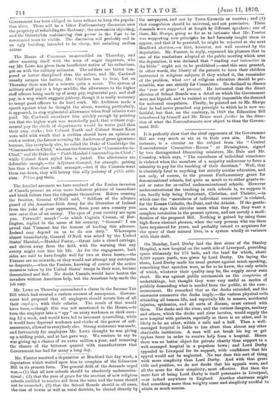The House of Commons re-assembled on Thursday, and after amusing
itself with the woes of sugar importers, who say Mr. Lowe has given them insufficient notice of his reductions, got on with the military estimates. The soldiers are better tem- pered or better disciplined than the sailors, and Mr. Cardwell usually escapes the baiting Mr. Childers has to bear, but on Thursday there was for a minute quite a scene. The system of military staff pay is a huge muddle, the allowances to the higher staff officers being made up of army pay, regimental pay, and staff pay, in a way which suggests jobbery, though it is really necessary to tempt good officers to do hard work. Mr. Anderson made a speech against what he thought the abuse, wanting particularly, it appeared, to stop regimental allowances when Staff salaries were paid. Mr. Cardwell overthrew him quickly enough by pointing out that the higher work was wretchedly paid, that without regi- mental pay the chiefs of departments would be worse paid than their own clerks ; but Colonel North and Colonel Stuart Knox were wild with wrath that a civilian should have an opinion on such a matter, the former accusing Mr. Anderson of gross ignorance because, like everybody else, he called the Duke of Cambridge the "Commander-in-Chief," whereas the Sovereign is " Commander-in- Chief," and the Duke the " Field-Marshal Commanding-in-Chief ;" while Colonel Knox styled him a jackal. The allowances are defensible enough,—the Adjutant-General, for example, getting less than a first-class traffic manager,—but if the Colonels want them cut down, they will betray this silly jealousy of pain criti- cism. Pains pay them.






























 Previous page
Previous page